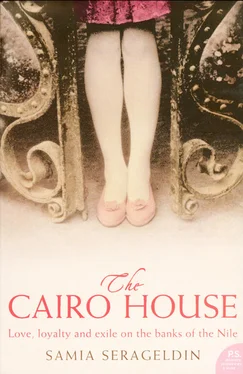Yet one summer night, there was Ali Tobia. He looked tired, the creases in the craggy face were deeper, but his smile was unchanged. He chucked me under the chin as if I were still seven rather than seventeen. Then he and my father went out to the verandah to talk in private. I remember seeing the tips of their cigarettes glowing in the dark for over an hour.
Only after Ali’s death did I learn from my father why he had come that night. He needed to confide in someone he could trust. He was convinced that Nasser was paranoid, clinically paranoid, and increasingly irrational and dangerous. A few months later Ali Tobia died overnight of an unexplained illness. It was generally believed that Nasser had his physician poisoned for spreading rumors about him.
The girl watching from the corner, the girl I once was. Where do I start looking for her? In retrospect, she seems to have drifted along like a leaf borne downstream. When could she have changed course?
I flip through an album of my own wedding pictures. These photographs are in color, and that difference in itself seems to mark a distinct shift in time and mood, the inherent glamor and nostalgia of the black and white images replaced by the stark, bright immediacy of the color prints. I am looking at a photo of a young bride with a round, sweet face and long, dark brown hair. She is looking straight at the camera, unsmiling, and the only expression behind the blankness of her wide eyes is a flicker of apprehension. But I am only guessing. I can close my eyes and get under the skin of the child of nine, but when I look at the photo of the bride of nineteen it is like looking at a stranger. Somewhere in the intervening years I have lost the key to her thoughts and emotions.
Perhaps it is the evolution girls go through in the process of molding themselves in the image of a feminine ‘other’. The wild, willful ‘I’ is mercilessly renounced like the outgrown, embarrassing, favorite things of childhood. They become strangers to themselves. Years later, a change in their lives can trigger a return full circle, and they rediscover their lost voice.
The Gigi I remember at eighteen was a little set apart by her circumstances and consequently unusually sheltered and naive. She lived largely in her books and her imagination; the outside world filtered through as feebly as light through the thick wooden shutters of Mediterranean windows.
In the way that the particular, rather than the general, colors our fundamental experience of growing up, hers was a cherished, normal girlhood. All children have nightmares about a bogeyman. For Gigi the bogeyman was real, he had a name and a face. The black-browed face was inescapable on a million posters throughout the country: the intense, sooty eyes, the prominent nose, the moustache, the lantern jaw. The name was whispered: Nasser, El-Raiis; his thousand eyes and ears lurked behind every corner. She did not have nightmares, only she was a very light sleeper, and she always woke at dawn, straining her ears; when they came for her father, it was at dawn.
She never heard her father talk about his experiences in the internment camps. At home he spent hours smoking in an armchair, lost in his thoughts. He had no land or business left to run. According to the sequestration decrees that applied to most of the men in the families affected, he was barred from practicing law or belonging to a professional syndicate or even a social club. Like a prisoner on parole, he could not leave the city without clearance from the authorities, nor leave the country under any circumstances. His revolver and passport were confiscated. Nasser’s sequestration decree went far beyond the confiscation of wealth or the stripping of civil liberties. It was the sharply-honed instrument of his malice: it emasculated, it isolated, it muzzled, it humiliated, it stigmatized; it forced retirement on men in their prime; it immured them in their own homes.
If the diffuse gloom that hung in the air at home had an effect on Gigi, it was to teach her a sort of precocious tact. She learned to be unquestioning and accepting, in order to spare the adults who imagined they were shielding her. She cultivated a bubbly surface. Mama in particular regarded any sign of moodiness as alarming.
She waited patiently for life to begin, without giving a single conscious thought to what she was supposed to be waiting for, until her aunt Zohra’s visit set the wheels of this unspoken destiny in motion.
‘Gigi! There you are.’ Madame Hélène stood at the door, a little out of breath. ‘Reading again? You’ll ruin your eyes, ma petite! Monsieur is looking for you. He’s in the study.’
Gigi put down Le Rouge et le Noir with a sigh. She went downstairs to the study. Papa was sitting at his desk. The window behind him let in the afternoon sunshine and a whiff of jasmine from the bushes outside. Gigi perched on the arm of his chair, watching him fill his pipe, his movements careful and precise, the back of his hands shadowed with dark hair. He had given up cigarettes years ago, since his first heart attack. Gigi loved the smell of the aromatic pipe tobacco.
‘Well, Gigi, your Arabic tutor tells me you need to do some reading if you’re going to pass your Arabic exam for the baccalaureate this year.’
Gigi made a face.
Her father laughed. ‘Considering that Madame Hélène was just complaining you stayed up all night reading a novel by Zola—’
‘Not Zola. Stendhal.’
‘Stendhal, then. Surely you can make yourself read a dozen pages a day of Naguib Mahfouz.’
‘His books are so – depressing.’ She flipped through a book titled Midaq Alley.
On her way elsewhere Gigi had been driven through some of these back alleys, her nose firmly buried in a French novel, avoiding the sight of the beggars; of the carcasses of meat hanging on hooks in front of the butcher shops; of the flies on children’s faces; of the peasant woman sitting cross-legged on the railroad station platform, suckling a baby on one swollen, bare breast. The woman had been totally unselfconscious, and no one had stared at her. Whether it was motherhood or misery that removed the provocation from her nudity, Gigi had not been able to tell.
Papa took the book from her and put it back on the shelf. ‘One day you’ll appreciate Mahfouz’s writing. But never mind for now.’ He pointed to the bookcase behind him. ‘Pick a book by Yussef El-Siba’yi. They’re harmless romantic novels about cavalry officers and pretty young girls.’
‘They sound like books by Delly. I don’t like the roman à l’eau de rose type either! But all right, if you insist.’
Gigi leaned against his shoulder.
‘Papa, were you ever sorry that I wasn’t a boy?’
‘Every day.’
‘Please be serious!’
‘Then why do you ask?’
‘It’s that I just found out that the sacrifice of the Feast is to ransom the male members in a family. Only the sons.’
‘Strictly speaking, that’s correct.’
‘But we always sacrificed a sheep and a lamb, and you always said the lamb was for me.’
‘As far as I’m concerned we ransom our blessings. And you were a blessing – most of the time!’
Domino suddenly started barking and the doorbell rang. In a minute the maid announced that Tante Zohra was at the door. Gigi ran upstairs to tidy up.
She looked out of her bedroom window. Tante Zohra’s ancient black Mercedes was parked in front of the house, and the driver was helping her out. Her tall, lean figure unfolded slowly out of the car. Gigi recognized the driver, Omar, although he was not her aunt’s regular chauffeur. He was an agent of the government intelligence service, the dread Mukhabarat, who had been assigned to follow Tante Zohra around several years ago. Like the rest of the family, she was the object of constant surveillance since the sequestration decrees.
Читать дальше











